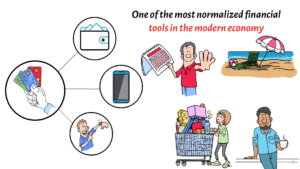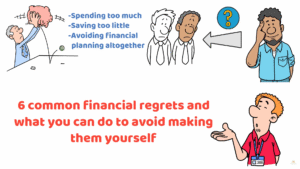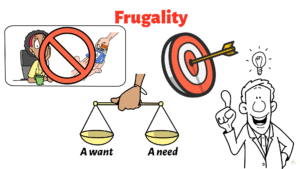Intro
Financial regrets 2025: 6 smart money mistakes to avoid. Tips to save, cut debt & grow wealth with It4Grow.
Everyone makes mistakes with money…everybody. Whether it’s spending too much, saving too little, or avoiding financial planning altogether, most people have at least one financial decision they wish they could take back.
The good news? You can learn from others’ regrets to make smarter choices now. Here’s a look at 6 common financial regrets and what you can do to avoid making them yourself.
1. Not Saving For Retirement Earlier
22% of Americans said not saving for retirement early enough is their top financial regret. In fact, it’s one of the most common regrets most people report.
When we’re younger, saving for retirement is rarely on the forefront of our minds, but with the opportunity of compound interest, it literally pays to start early. Every dollar you save today has the potential to grow exponentially for years to come.
The problem is, it’s easy to put it off, especially when you’re focused on paying off student loans, paying for your children’s daycare costs, or even saving for a home. These are all valid expenses that can take precedent over saving for your future self.
But time is the most powerful tool you have when it comes to retirement savings. Starting early, even with small amounts, allows your money to grow thanks to compound interest.
The reality is, the earlier you begin investing, the less you need to set aside each month to reach the same goal. Someone who starts investing at 25 can build a significantly larger retirement fund than someone who waits until 35, even if they contribute a larger amount.
The difference isn’t just numbers on a page; it’s the freedom to retire comfortably or having to work longer than you’d like. Start now. Even if it’s just $50 or $100 a month, put something into a retirement account.
If your employer offers a 401(k) with matching contributions, take full advantage of the match. If that’s not an option, open a Traditional or Roth IRA. Lastly, automate your contributions.
When you rely less on your own willpower, you’ll find consistency is much easier to keep.
2. Failing to Build (And Rebuild) An Emergency F
Emergency funds aren’t exciting. They don’t earn big returns, and you hope you’ll never need to use them. But when life throws a curveball, you’ll be glad you have it. A job loss, major home repair, or one of your kids breaking his arm, can set you back months, even years, if you’re not prepared.
Without an emergency fund, even a relatively small expense can force hard choices: delay rent, skip a utility bill, or rack up interest on a card.
That’s not the only thing that can derail you either. With global markets shaky, inflation hitting everyday essentials, and layoffs making headlines, the lack of a safety net is more dangerous than ever.
Too many people fall into the trap of relying on credit cards or high-interest loans to bridge the gap. That short-term fix often snowballs into long-term debt.
An emergency fund doesn’t prevent crises, but it cushions the blow, letting you stay on your feet financially while dealing with the unexpected.
So how do we solve for this? One of the easiest ways to move toward saving more is setting up automatic transfers. Take the decision away from yourself. Every time you get paid, have money automatically moved out of your checking account to a savings account.
And have that savings account at a different location so the money is moved out. You typically won’t spend what you don’t see.
Now if you did have an emergency and you dipped into the fund, congratulations, it’s done its job! Now, let’s focus on replenishing it.
The biggest mistake people make after using their emergency fund is not prioritizing its rebuild.
Life doesn’t wait and crises rarely come one at a time. Refill that tank before the next one hits.
Treat your emergency fund like a bill. Immediately pause any non-essential spending, things like streaming services, eating out multiple times a week, or even game or music subscriptions.
Reroute the money to rebuilding the fund. This step is really easy because you’re already spending that money; you’re just going to redirect it now.
The second thing you can do is to temporarily get a side hustle or part time gig to help supplement your income and quickly rebuild. Even an extra $100–$300 a month makes a real dent.
An emergency fund is more than just money; This is mental protection. This helps you to get better sleep at night, take career risk, handle family emergency situations, and stay out of debt spiral. And in today’s unpredictable world, this peace is worth its weight in gold.
3. Taking On Too Much Debt
14% of Americans regret how much loan they had taken – whether it is from student loan, car payment, or credit card balance. In particular, high-blessings like a credit card are notorious for quitting your finance over time.
What can begin as a small balance to help you get out of a sticky state, can increase a monthly burden that limits your options and causes anxiety and stress.
The 2024 survey of Dogn.com revealed that about 45% of adults depended on the credit card. In fact, more than 1/3, the credit card was maximized.
The thing is that when necessary, it is easy to justify the loan.
Maybe you spent money on an extravagant wedding, but now it’s holding you back from other financial goals like buying a home or having kids. Suppose you took that trip in your 20s because you wanted to experience the world, but you lived on your credit cards.
Or perhaps you went to an expensive University and now the degree that you got, you don’t even use. In a recent survey, they found over 40% of grads worked in a field that did not require their degree, even a decade after graduating.
Taking on too much debit is often a result of spending beyond our means or not planning ahead.
The emotional toll of debt—feeling trapped, anxious, or ashamed—can be just as harmful as the financial cost.
So, the best way to avoid all of those messy feelings is to avoid unnecessary debt in the first place.
Live within your means. Use credit cards only if you can pay them off in full every month; if you can’t, don’t use them at all, cut them up. If you already have debt, make a plan to aggressively pay it down. Don’t ignore it or just pay the minimums, tackle it head-on.
4. Prioritize needs over wants, ruthlessly.
Many people, especially those who grew up during financial crises or watched their parents struggle, are hesitant to invest.
In fact, the fear of losing money leaves a lot of people sitting on the sidelines instead of invested in the market or ventures like real estate. To them, keeping their money in cash or low-interest accounts feels safer.
But over time, this caution can become costly thanks, in part, to inflation. Inflation is when the prices of things you buy—like food, gas, and clothes, go up over time.
That means the same amount of money buys less than you’re used to.
We’ve all made the job that a tank of gas when were younger was considerably cheaper than filling your tank today. That is result of inflation, and it eats away at your purchasing power.
So, the regret here isn’t about losing money; it’s realizing how much more you could have had by taking calculated risks.
The first step is to learn the basics of investing. You don’t need to be a stock-picking genius, you don’t need to study the markets every morning, or even learn to day trade.
A diversified portfolio of low-cost index funds is a smart choice for most people.
Start small, understand your risk tolerance, and invest consistently. Consider speaking with a financial advisor if you’re unsure where to start.
Being too conservative can be just as risky as being completely reckless.
5. Not Getting Professional Financial Advice
There’s a common belief that financial advisors are only for the wealthy. As a result, many people try to navigate complex financial decisions on their own, and some come to regret it.
The truth is, as we get older, our financial lives become considerably more complex.
We buy a home, we have children whose educations we’d like to help fund, our parents are getting older and may need some assistance from us.
Maybe you decide you want to go back to school for more training or a business partner approaches you about an investment opportunity.
There a whole number of things than can contribute to your financial life. You don’t have to navigate it alone.
Consider speaking to a certified financial planner, especially during major life transitions; marriage, children, buying a home, career changes, or retirement.
A good advisor can help you clarify goals, create a plan, and avoid common pitfalls.
They can also help keep your financial behavior in check, especially during volatile market times.
Even if you just want someone to look over your finances every now and then, many advisors now offer fee-only or hourly services, making it more accessible than ever.
Just having another pair of eyes to look over your plans can help you avoid expensive financial mistakes.
6. Failing to Educate Yourself About Money
One of the biggest underlying regrets is simply not taking the time to learn about personal finance.
We weren’t taught how to budget, invest, manage debt, or even how to do our taxes. But ignorance isn’t bliss when it comes to money. It’s extremely expensive.
Looking back, people often say they wish they had taken the time to understand the basics earlier.
A 2024 MarketWatch survey found that only 57% of adults were considered financially literate.
Money is incredibly influential. It affects our education, where we live, our careers, even our partners. It’s important to understand how it works.
Commit to lifelong learning. Read books, watch YouTube channels, or listen to podcasts.
Even 15 minutes a day adds up. The more you understand, the more confident and empowered you’ll feel about your financial decisions.
Conclusion
Financial regrets are a powerful teacher – but you do not have to learn a difficult way. And if you already have financial regrets, do not pay attention to them.
Start saving quickly. Spend deliberately. Invest wisely, and beyond, be curious and stay connected with your financial life.
Because the best way to avoid regret tomorrow is to take action today.





